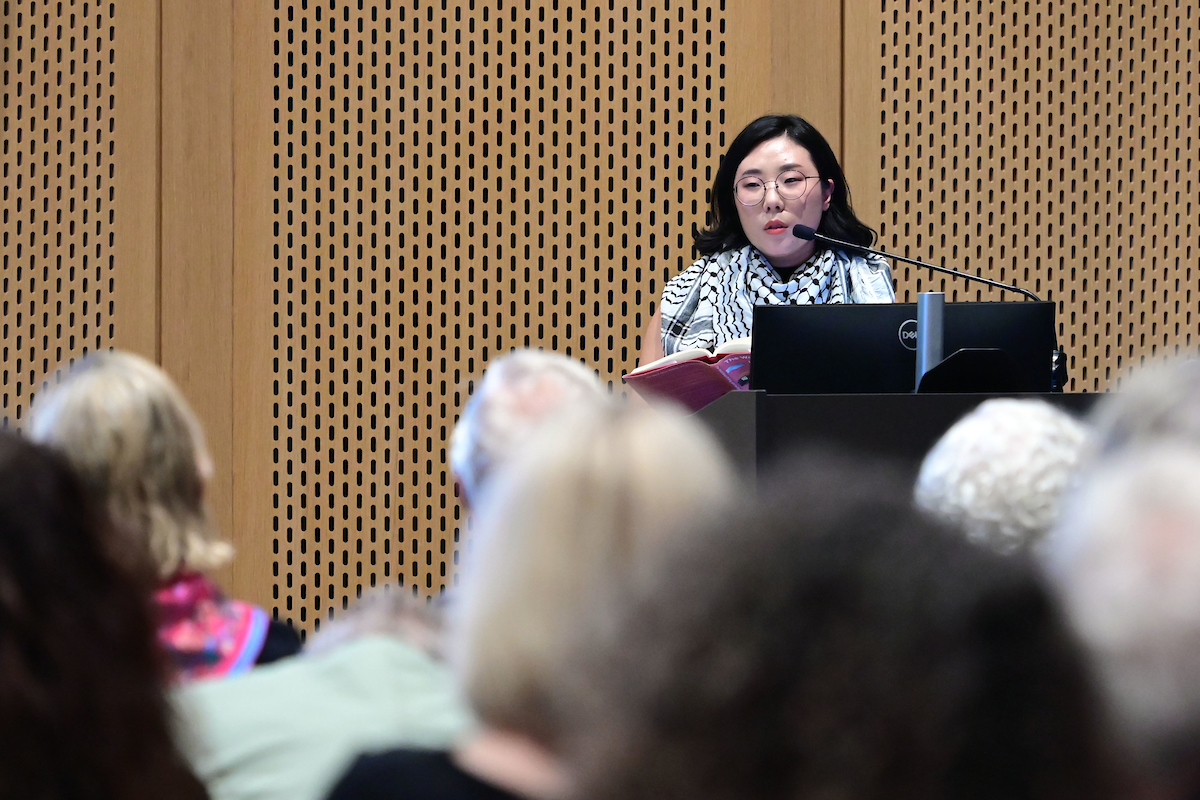For poet and essayist Franny Choi, the apocalypse has already come. Actually, it came many years ago for marginalized people, and it continues today. As their recent work suggests, though, this rather dreary view is not incompatible with hope; in fact, the apocalypses of the past may be the only places we find hope for the future.
On Monday, Oct. 23, Choi visited Tulane as the 2023 Arons Visiting Poet. This Newcomb Institute program has brought innovative woman-identifying poets to Tulane for readings and workshops for over 20 years.
Choi’s work, which includes three award-winning poetry collections, has been featured in The New York Times, The Atlantic and on NPR. Conversely, these news outlets also serve as fodder for Choi’s poems, many of them exploring the relation between the individual and the socio-political movements that surround and permeate them. The intersection of race, gender, history and technology — especially as viewed from their queer, Korean-American identity — is the main locus of Choi’s writing.
After an introduction that included the traditional reading of a poem by the program’s namesake, Florie Gale Arons, Choi rose to the podium in front of an attentive audience. Their endearingly nerdy air belied the atomic force of their first poem, “The World Keeps Ending, and The World Goes On,” which gave their most recent poetry collection its title.
The poem, as well as the ones that followed it, touched on the civil rights protests of the 1960s, the unrest of 2020, nuclear meltdowns, mosque bombings, pipelining conflicts and climate change. In accordance with the poems’ content, Choi’s slam-influenced style had marks of political rhetoric in it, frequently employing anaphora and a rhythm that was almost marchable.
But in the godless world that Choi conjures up through their poems — a world that mediates the real and imaginary, the historical and the speculative — there is nevertheless something holy. The repetition in the poems, which in some places recalls political speech, evokes in others the curving cadence of prayer; the shift occurs almost imperceptibly. As Choi writes in their poem “Look,” “people [attempt] godliness in a hundred wrong ways.” Poetry, it seems, is their hopeful attempt at something like it. At the very least, it is their way of finding comfort in a dystopian world that renews its end every day.
One of the highest points of the evening occurred when, following one poem, Choi played an audio clip of a men’s choir singing an arrangement of it. This music captured something essential in Choi’s writing — if such a thing is possible, the emotional immediacy of the sound made it more like their poem than the poem itself. The lead tenor voice floated over a dark, undulating sea of harmonies, its motion reciprocally stirring and and being stirred by the movement of the voices beneath. The quality of the voices was, like Choi’s writing, a startling mixture of the sacramental and the colloquial, a Gregorian chant charged with pop-inspired vocal power. As the seven-minute song ended almost in a whisper, the audience let out a collective breath.
The event concluded with a question and answer session, Choi choosing hands from the audience almost giddily. They provided insights about the role of mood in their writing, their writing process, their side projects and their astrological sign, among other things.
In poetry, it is a perennial struggle to determine whether you are having a profound experience of art or are simply experiencing the profundity of the distance between it and your expectations for it. For much of the reading, I bounced between these two possibilities; it’s difficult to be moved by any art about something like the COVID-19 pandemic these days. It was only with one of the final lines Choi uttered that my wavering ceased:
“You don’t have to believe in something for it to startle you awake.”




Leave a Comment